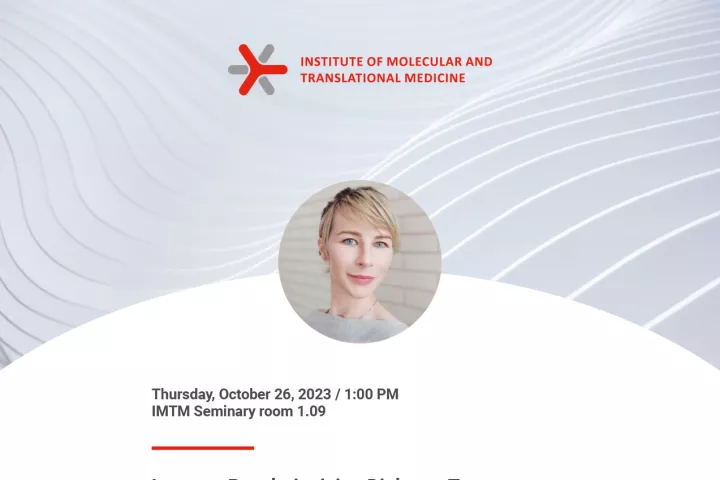Thursday October 26, 2023
1 PM / Seminary room 1.09
We would like you to invite you to another lecture of the Mendel-Zirm Lecture Series. The speaker is Dr. Anna Czarna from Malopolska Centre of Biotechnology, Jagiellonian University, Gronostajowa, Krakow in Poland. Anna Czarna received her PhD degree in 2009 at the Max-Planck-Institute in Munich in the laboratory of Nobel Prize winner Prof. Robert Huber, in Prof. Holak's research group, where she characterized inhibitors of proteins important in tumorigenesis.
Abstract
Small molecules targeting protein kinases are among the best tools for advanced therapy. They allow us to understand the mechanisms of disease. It has been shown that kinase DYRK1A negatively affects β-cell proliferation and activity. Therefore, it provides a target for designing inhibitors that will enable β-cell regeneration - leading to a reduction in insulin-producing cell loss in type I diabetes (T1D) and increased insulin production in type II diabetes (T2D). The inhibitors under investigation are potential regulatory agents that restore pancreatic β-cell mass, secretory, and organ regulatory functions. In these studies, we used AC27 compound and a reference inhibitor Harmine, the first identified small molecule inhibitor of DYRK1A and remains the gold standard in β-cell proliferation. Obtained results confirmed that DYRK1A inhibitors encapsulated in the Pluronic P123 nanocarrier regulate blood glucose levels in BALC/c mice with induced diabetes. The use of Pluronic P123 stabilized sugar levels in mice in a shorter period of time, minimized side effects and allowed for fewer doses of inhibitors to be administered. The induction of β-cell proliferation and function by small molecules promises future therapeutic utility.
BIO
Anna Czarna's first postdoctoral training took place at MPI and LMU, in the group of Prof. E. Wolf, where she worked on the understanding of the mechanisms of light regulation of the circadian clock. The work describing the structural analyses of critical circadian clock proteins was published as author's in Cell. Another post-doc was held at Harvard Medical School in Boston, USA where she successfully analysed stem cell applications in regenerative medicine, vascular disease and diabetes. She continued her research in regenerative medicine as a staff member at Cardiocentro Ticino in Lugano, Swiss Institute for Regenerative Medicine, where she studied the regenerative potential and formation of new functional cell structures in heart and lungs. The results of these studies became a valuable clinical guideline for the treatment of patients with heart failure of ischemic origin. In 2015, she moved to the Arctic University in Tromsø, Norway, to combine structural studies with kinase signaling to identify molecular targets for lung and breast cancer therapy. There she obtained her first major research grant. In 2018, she joined Prof. J. Wang's group at South China University of Technology (SCUT) in Guangzhou, China where she learned about cutting-edge developments in nanotechnology and biomaterials for combined personalized therapies using own organoid platform.
In 2019, Dr. Czarna was awarded a prestigious National Agency for Academic Exchange (NAWA) installation grant which allowed her later to establish a research group at the Małopolska Centre of Biotechnology at Jagiellonian University. She is currently combining her scientific experience and international contacts in an interdisciplinary research on the use of regenerative medicine advances and structural biology.
Photo: Denisa Pavelková




